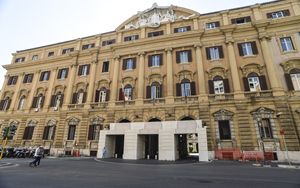(Finance) – The international price of oil “has not recorded, with reference to the average of the previous two months, an increase compared to the reference value indicated in the Def which allows the adoption of the decree to reduce the excise tax rates applied to diesel and petrol”. This was stated by MEF undersecretary, Lucia Albano, answering a question by Emiliano Fenu (M5S) in the Finance Committee of the Chamber.
Albano cited data from Mimit updated to 31 July according to which the average price of petrol is 1.91 euros per liter and that of diesel is 1.76 euros.
In the meantime, as foreseen in the Transparency law decree of January, the scoreboard on the average price of fuels will start. Each citizen can check when he goes for petrol if he is subjected to a higher than average cost. The consumer will be able to ascertain and choose”, said the Minister for Enterprise and Made in Italy, Adolfo Urso, yesterday at a press conference on the cost of fuel
“We believe it is possible to contain prices and contain the increase if there were international quotations”Urso added. This concerns the obligation to display the regional average price on the road network, and the national average price for the motorway network. The data will be communicated to the ministry at eight in the morning. Both rising and falling detection. Sanctions are envisaged on the basis of checks by the Guardia di Finanza.
However, the pressing by the associations does not stop. In a note, the UNC stresses that anomalous increases in fuel prices can always be denounced and all consumer associations, starting with the Unc, have been doing so for decades. “It’s a pity that no one has ever punished them, given that Parliament refuses to give a definition of anomalous price” says Massimiliano Dona, president of the National Consumer Union asking the minister, “what happened to the fuel app envisaged by the decree- Law No. 5 of 14 January 2023, i.e. over 6 months ago, which, yes, would be very useful for filling up at the least expensive petrol station in the area, unlike the average price which instead gives distorted and wrong information: that to be satisfied with going to fill up with anyone who has a lower price than the average instead of those who have the lowest prices and are cheaper than the others”.
Also Absolute users asks the Government for a further effort in favor of consumers. “If on the one hand it is useful to provide information to motorists on average fuel prices, on the other it is necessary to study new measures to trigger competition between operators and encourage a reduction in price lists – explains the president Furio Truzzi – In this sense the best solution is represented by billboards to be installed in the various areas of large cities and in all municipalities showing, like what already happens along the motorways, the prices of petrol and diesel charged by the operators located nearby, with a bright green dot that indicates motorists the most convenient distributor in the area. Furthermore, a national app managed by Mimit is needed with fuel lists updated in real time, which allows motorists to immediately identify the best prices in the area”.
Federconsumatori shows concern for the race in fuel prices: today Quotidiano Energia reports an average price of 1.912 euros per liter for petrol and 1.766 euros per liter for diesel.
Prices which, “as we have not tired of underlining for some time, stand at excessively high levels compared to the quota to which they should stand. According to data from the ONF – Federconsumatori National Observatory, which take into account both the trend in the prices of petroleum products, and the trend of the Euro/Dollar exchange rate, petrol today should cost at least 7 cents less per litre.
This entails an annual burden, in direct terms, for each motorist who refuels with 2 full tanks a month, of 84 euros in the case of petrol. Added to this are the serious indirect repercussions that fuel increases have on the price trend of goods (more than 86% transported by road) and services, which according to our estimates amount to around 69 euros per year of expenditure on more for family. The total repercussions, in this way, amount to 153 euros per year per motorist”.
